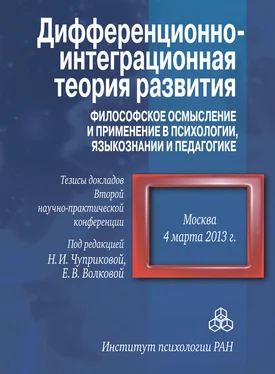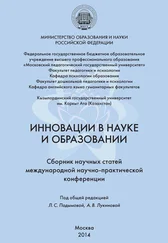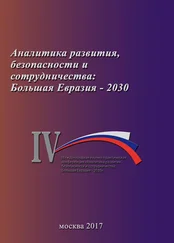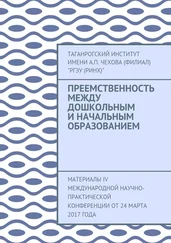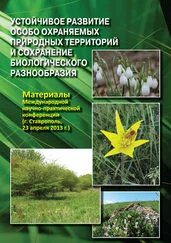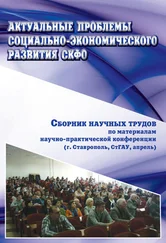The first conference on this problem in our country organized by PI RAE, IP RAS, MSPPU took place in 2009. The conference expanded materials were published in collective volume “Differentiation – integration theory of development” (2011). Twenty scientists representing different areas and directions in mental development studies contributed to this book. The contributions are framed to the integration – differentiation theoretical approach both conceptually and terminologically, many results and conclusions cross-confirm and complement others.
The present one, the second conference is devoted to discussion of this theoretical approach. A number of new problems and questions are raised in the presented reports, such as: links of the differentiation – integration theory of development with the self-organization theory, new points of view on the origin of mind and mental development in phylogenesis and the creativity mechanism, new programs of training corresponding to the differentiation – integration way of mental development.
It is important to notice that in some current research abroad the ideas about differentiation – integration character of development and “pyramidal” (i. e. from the general to the particular) structure of brain information processes are used for discussion of experimental data. But unlike Russian research, these works are not part of more than 350-year-old tradition of the European theoretical scientific thought.
It is hardly possible to doubt about the value of the general interdisciplinary theory overcoming national barriers and connected with names of Komensky, Hegel, Spenser, Soloviev, Setchenov, Werner. This theory would unite substantially different directions, areas and aspects of mental development research and promote consolidation of forces and progress of the general evolutionary view on the world development.
N. I. Chuprikova Psychological Institute, Russian Academy of Education
В. А. Лекторский (Институт философии РАН)
Дифференциация, сложность и стадии развития
Концепция развития как изменения от нерасчлененной целостности к внутренне дифференцированной и структурированной системе в целом соответствует многим наблюдаемым фактам. Вместе с тем сама общая концепция развития может быть сегодня конкретизирована и кое в чем скорректирована в связи с новыми подходами к пониманию развития в рамках теории самоорганизующихся систем (синергетика), теории сложности и идеи глобального эволюционизма. В этом контексте появляются новые проблемы, которые сегодня активно обсуждаются. Сегодня говорят о мерах сложности системы и о повышении сложности в процессе развития. Сложность можно соотнести с дифференциацией, но понятие сложности точнее, так как можно выявлять меру сложности. В процессе развития не только имеет место переход от первоначальной целостности к последующей расчлененности (это обычно бывает в рамках одной системы), но также возникновение новых систем и новых системных уровней. Взаимоотношения старых и новых систем бывают разными. Новые системы могут вытеснять старые. Новый системный уровень может возникать на основе развития базовой системы – как бы надстраиваться над нею. При этом свойства более высокого уровня нельзя понять на основе свойств и процессов базового уровня: имеет место то, что называют эмерджентностью – возникновение нового, которое нельзя редуцировать к тому, из чего оно возникло. Важно при этом, что вышележащий уровень перестраивает базовый и во многом определяет его функционирование. Конечно, в процессе развития имеет место переход к большей дифференциации (большей мере сложности). Однако это не просто некий единый процесс, а возникновение новых систем и новых уровней, характеризующихся такой дифференциацией, которая не только не совпадает с тем, что имело место на предшествующих стадиях, но и часто не может быть понято как непосредственное продолжение того, что имело место ранее. То, что было дифференцировано ранее, может игнорироваться на новом уровне.
V. A. Lektorskiy (Institute of Philosophy, Russian Academy of Science)
Differentiation, complexity and stages of development
The conception of development as a movement from a non-differentiated whole to a differentiated and structured system corresponds to a lot of facts. But now the general notion of development can be specified and corrected in the light of new approaches in the frameworks of the theory of self-organizing systems (synergetics), the complexity theory and the idea of global evolutionism. In this context new problems arise, which are being heatedly discussed. One of these is the problem of complexity. It is possible to speak about the measures of complexity and the increase in complexity in the process of development. Complexity can correlate with differentiation. But it seems that the notion of complexity is more exact than that of differentiation, as the former can be measured. In the process of development there is not only a transition from a primary whole to differentiation (it usually happens in the framework of a single system), but also arising of new systems and new system levels. Relations between old and new systems can be various. New systems can supplant old ones. A new system level can arise on the basis of a primary system – as if its superstructure. Properties and processes of a higher level cannot be understood on the basis of knowledge of properties and processes of a primary level. Thus there is a case usually termed "emergence", i. e. the new cannot be reduced to processes at a base level. It is important that the higher level transforms the basic one and determines its functioning. Certainly, in the process of development a transition to a greater differentiation (greater measure of complexity) happens. But it is not an indivisible process: new system and new systemic levels have a differentiation which is not identical to a previous one, often a new differentiation cannot be considered as a simple continuation of the latter one.
И. А. Хватов (Московский гуманитарный университет), А. Н. Харитонов (Институт психологии РАН)
Читать дальше
